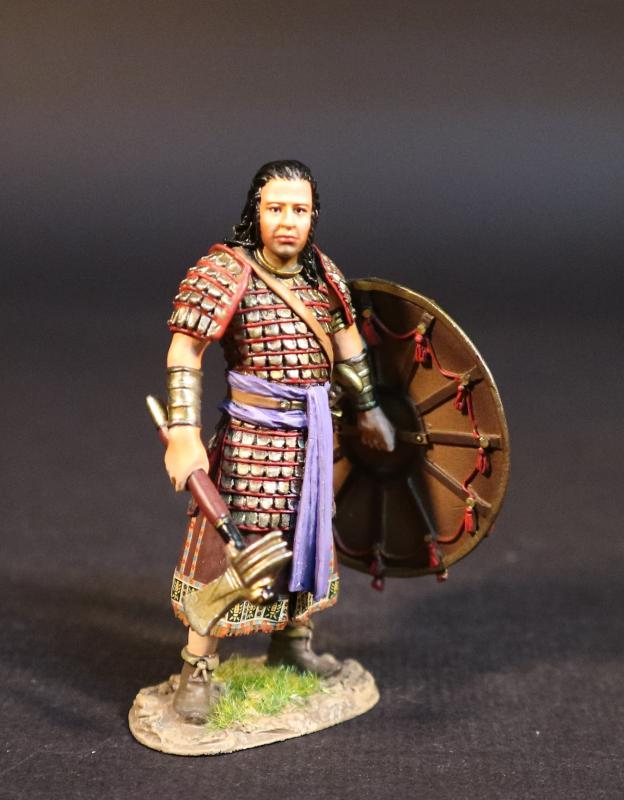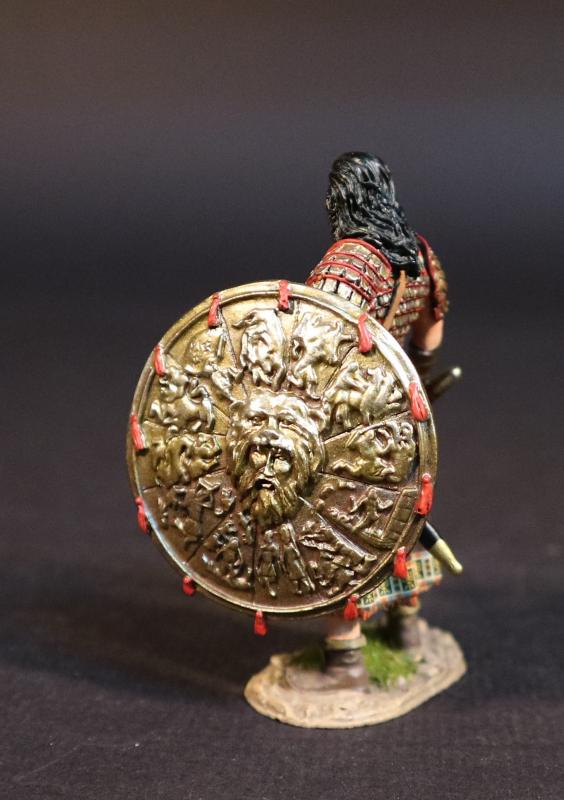Eurypylus, Prince of Mysia, Troy and Her Allies, The Trojan War--single figure with axe and round shield
$56.00
Item Number: TWT-11
Memnon, King of Aethiopia, Troy and Her Allies, The Trojan War
THE TROJAN WAR
THE TROJANS
Traditionally, the Trojan War arose from a sequence of events beginning with a quarrel between the goddesses Hera, Athena, and Aphrodite. Eris the goddess of discord, was not invited to the wedding of Peleus and Thetis, and so arrived bearing a gift: A golden apple, inscribed “for the fairest”.
Each of the goddesses claimed to be the “fairest”, and the rightful owner of the apple. They submitted the judgement to a shepherd they encountered tending his flock. Each of the goddesses promised the young man a boon in return for his favour. Power, wisdom, or love. The youth, in fact Paris, a Trojan prince who had been raised in the countryside, chose love, and awarded the apple to Aphrodite.
As his reward, Aphrodite caused Helen, the Queen of Sparta, and the most beautiful of all women, to fall in love with Paris.
The judgement of Paris earned him the ire of both Hera and Athena, and when Helen left her husband, Menelaus, the Spartan king, for Paris of Troy, Menelaus called upon all the kings and princes of Greece to wage war upon Troy.
Menelaus’ brother Agamemnon King of Mycenae, led an expedition of Achaean troops to Troy and besieged the city for ten years because of Paris’ insult. After the death of many heroes, including the Achaeans, Achilles and Ajax and the Trojans Hector and Paris, the city fell to the ruse of the Trojan Horse. The Achaeans slaughtered the Trojans, except for some of the women and children whom they kept or sold as slaves. They desecrated the temples, thus earning the wrath of the gods.
Few of the Achaeans returned safely to their homes, and many founded colonies in distant shores. The Romans later traced their origin to Aeneas, Aphrodite’s son and one of the Trojans, who was said to have led the surviving Trojans to modern day Italy.
The Trojans, too had their semi-divine heroes and these included Hector (son of Priam), Aeneas, Sarpedon, and Glaucus, just to name a few. They also had help from the gods, receiving assistance during the battle from Apollo, Aphrodite, Ares and Leto.
The Trojan army defending the great city of Troy, led by their king Priam, had assistance from a long list of allies. These included the Lycians, which was a maritime district in south western Anatolia (now Turkey). It was situated along the Mediterranean coast between Caria and Pamphylia, and extended inland to the ridge of the Taurus Mountains.
EURYPYLUS, PRINCE OF MYSIA
Euryplyus was the son of Telephus, King of Mysia. He was a great warrior, who led a Mysian contingent that fought alongside the Trojans against the Greeks in the Trojan War.
In a prelude to the Trojan War, the Greeks attacked Mysia, mistaking it for Troy. Eurypylus’ father Telephus was wounded by Achilles and later, when his wound continued to fester, was also healed by Achilles. According to some accounts, because of this, Telephus promised that neither he nor his family would aid the Trojans in the coming war.
Nevertheless, during the final stages of the war, between the death of Achilles, and the ruse of the Trojan horse, Eurypylus led a large Mysian force to fight on the side of Troy. Some accounts state that Priam obtained Eurypylus’ aid in the war by giving his mother, Astyoche, a golden vine, or by promising Eurypylus one of his daughters as a wife.
Eurypylus was a great warrior and killed many opponents, including Machaon, Nireus, and Peneleus.
Neoptolemus finally killed Eurypylus, using the same spear that his father Achilles had used to both wound and heal Eurypylus’ father Telephus.
Homer has Odysseus say that Eurypylus was, next to Memnon, the most beautiful man he had ever seen, and there were nearly one hundred lines of the poem devoted to a detailed description of Eurypylus’ shield, which was adorned with depictions of the twelve labours of Hercules. Dressed for battle, Eurypylus "seemed the War-god".
Released in JUNE 2024.

